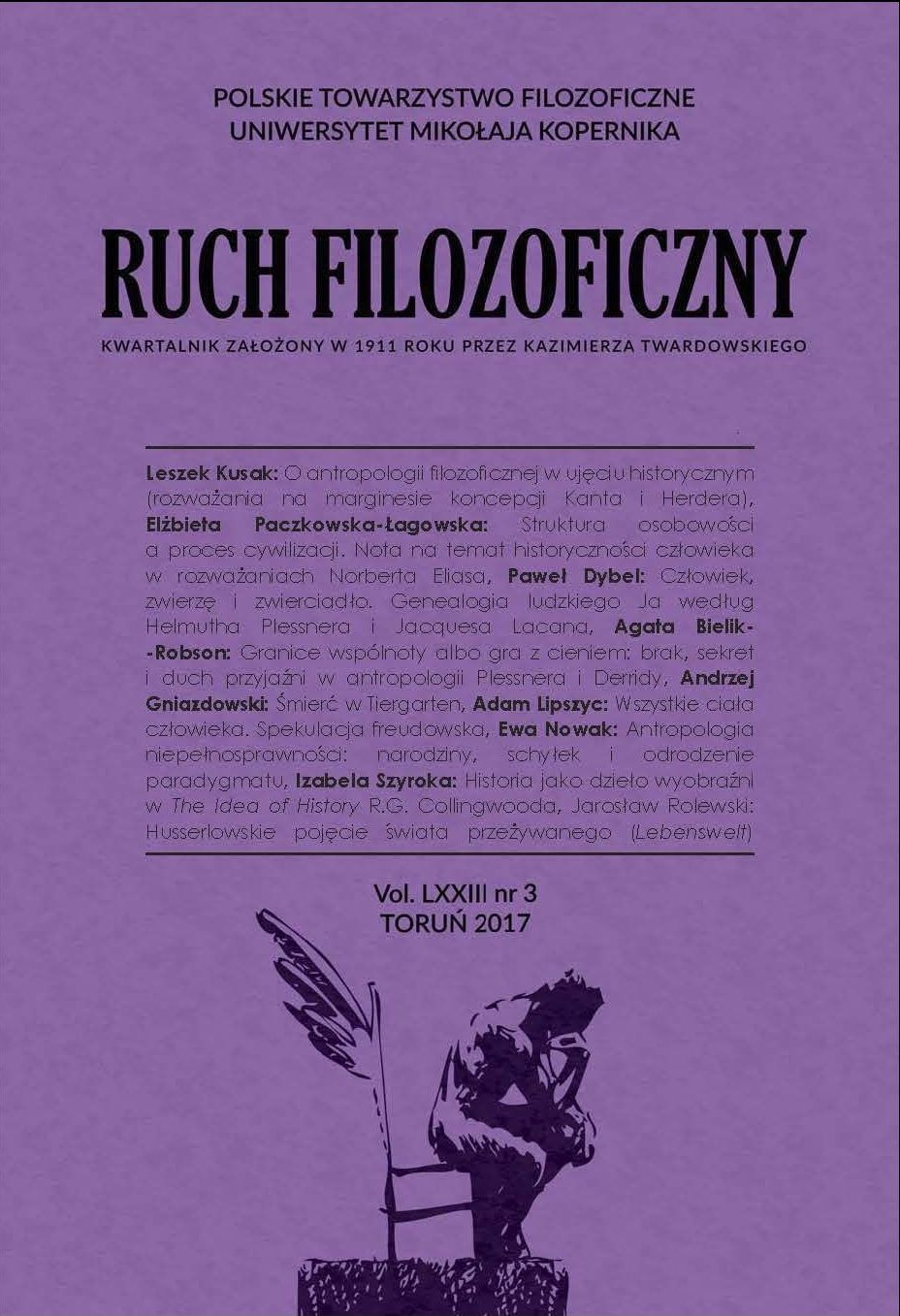Death in Tiergarten
DOI:
https://doi.org/10.12775/RF.2017.025Keywords
philosophical anthropology, Polish literature, political philosophy, national identity, Sonderweg, nationalism, antisemitismAbstract
The subject of the article is the comparison of two approaches to German-Polish relations: the one of Helmuth Plessner, the founder of the contemporary philosophical anthropology and one of first theoreticians of German “Sonderweg” in the history of Europe, and that of a Polish writer Witold Gombrowicz as one of the most radical critics of the Polish “national Form”. Its starting point is the presentation of the main assumptions of Plessner’s philosophical anthropology, especially his idea of the human as an eccentric positional being, as well as the literary representation of man as a being shaped from outside, which one can find in the work by Gombrowicz. The historical source of that comparison is, on the one hand, the analysis of German national consciousness and political culture, first introduced by Plessner in 1935 in his Schicksal deutschen Geistes im Ausgang seiner bürgerlichen Epoche, and further published in 1959 in the book entitled The Belated Nation, and, on the other hand, the fragments of the Diary by Gombrowicz from 1964, published separately on German as Berliner Notizen (1965). While presenting the substantial convergences of those views as well as subjecting to critical assessment the premises of the same substantial differences between them, author, on that basis, aims at the reconstruction of the conditions which would enable, German-Polish recognition, that would go beyond the national solidarities.
References
„Dieses Glitzerding“ (anonimowa recenzja z Berliner Notizen), „Der Spiegel“, 1965, Hf. 46.
Fischer J., Philosophische Anthropologie. Eine Denkrichtung des 20. Jahrhunderts, Freiburg–München 2009.
Fischer J., Die exzentrische Nation, der entsicherte Mensch und das Ende der deutschen Weltstunde. Über eine Korrespondenz zwischen Helmuth Plessners philosophischer Anthropologie und seiner Deutschlandstudie, w: Deutsche Vierteljahrsschrift für Literaturwissenschaft und Geistesgeschichte, 3 (1990).
Gombrowicz W., List do redaktora „Wiadomości”, „Wiadomości”, nr 4 (304), Londyn, 27 stycznia 1952.
Gombrowicz W., Dziennik 1953–1956, Kraków 1989.
Gombrowicz W., Dziennik 1957–1961, Kraków 1989.
Gombrowicz W., Dziennik 1961–1966, Kraków 1989.
Gombrowicz W., Berliner Notizen, przeł. W. Tiel, Pfullingen 1965.
Krasnodębski Z., Potrzeba zwątpienia. O antropologii politycznej Helmutha Plessnera, w: idem, Postmodernistyczne rozterki kultury, Warszawa 1996.
Mann T., Deutschland und die Deutschen, Stockholm 1947.
Mann T., Rozważania człowieka apolitycznego, przeł. J. Kałążny, w: Sonderweg. Spory o niemiecką „drogę odrębną”, red. H. Orłowski, Poznań 2008.
Plessner H., Schicksal deutschen Geistes im Ausgang seiner bürgerlichen Epoche, Zürich und Leipzig 1935.
Plessner H., Die verspätete Nation. Über die politische Verführbarkeit bürgerlichen Geistes, w: Plessner H., Gesammelte Schriften, t. 6, Frankfurt am Main 2003.
Plessner H., Mit anderen Augen. Aspekte einer philosophischen Anthropologie, Stuttgart 1982.
Plessner H., Opóźniony naród. O politycznym pokuszeniu ducha mieszczańskiego, przeł. J. Kałążny, w: Sonderweg. Spory o „niemiecką drogę odrębną”, red. H. Orłowski, Poznań 2008.
Plessner H., Granice wspólnoty. Krytyka radykalizmu społecznego, przeł. J. Merecki, Warszawa 2008.
Plessner H., Władza a natura ludzka. Esej o antropologii światopoglądu historycznego, przeł. E. Paczkowska-Łagowska, Warszawa 1994.
Plessner H., Pytanie o conditio humana, przeł. M. Łukasiewicz, Warszawa 1988.
Teresa Benedykta od Krzyża, Św. (Edyta Stein), Autoportret z listów. Część trzecia: Listy do Romana Ingardena, przeł. M. Klentak-Zabłocka, A. Wajs, Wydawnictwo Karmelitów Bosych, Kraków 2003.
Downloads
Published
How to Cite
Issue
Section
Stats
Number of views and downloads: 740
Number of citations: 0



